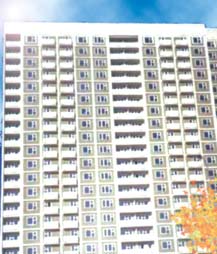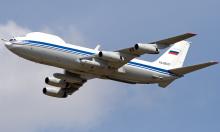Man-caused tragedies on the rise in Moscow
 Director of the surveillance center of environmental and geophysical prognosis Igor Yanitski has been studying “underground life” for 40 years.
Director of the surveillance center of environmental and geophysical prognosis Igor Yanitski has been studying “underground life” for 40 years.
According to him, construction workers of today no longer listen to geophysicists. Multi-story giant buildings are being built at an incredible rate these days, bringing mind-boggling profits. Moscow isn't suited for such constructions. The recent collapse of the “Transvaal” aqua park can in fact trigger the beginning of an entire chain of man-caused catastrophes.
-Igor Nickolaevich, is it true that Moscow stands on hollows instead of the seven hills?
-Geographically, Moscow is situated on hills. From the geophysical perspective however, the city stands on cavities and cracks. Our ancestors were aware of it instinctively and tried to consider such geological nuances of their motherland. They considered it a living organism. Beginning of past century gave rise to a common misconception. It was assumed that a firm stone stronghold was located underground.
Back in the 60s, I along with my colleagues began geophysical investigation of Moscow's soil at great depths. As a result, we discovered an ample quantity of helium, a chemical element that is only present around active geological cavities. It turned out that Moscow stands on the crossing of two transcontinental ruptures surrounded by small cracks. There are several dozens of them there. All of them are filled with water. Therefore, buildings in the city have to be erected with utmost precision, only in places of deep dry land, the so-called underground islands.
-Whom did you report the results of your work?
-I was forwarded to Director of the Institute of Geochemistry and Analytical Chemistry of Russian Academy of Sciences, academician A. P. Vinogradov. He carefully examined our maps and schemes and soon formed a special commission including specialists from various fields: physicists, land-surveyors, historians, archivists and others. For years, we have been studying Moscow in details. Every new construction was carefully inspected by the commission. Some time later, our data has been confirmed by satellite photos.
It all started from one fascinating discovery. We found manuscripts containing some allusions to the times of Ivan the Terrible, when people had witnessed strange ground movements that had even caused Church roofs to collapse. Our ancestors had noticed the signs. They all had been aware of some earthquake danger zones in Moscow.
-Then why was this information about underground cavities kept secret from the public for all these years?
-Unfortunately, people did have a chance to experience some minor ground shaking. Here are a few examples. Back in the forties for instance, an apartment building on Osipenko Street collapsed under rather strange conditions. Everyone assumed the incident was caused by a gas leak. Several years later however, one of the leading specialists of the Institute of Physics of the Academy of Sciences E. V. Barkovski was able to prove that it was a seismic phenomenon. In the beginning of 70s, strange vortexes started to appear on Khoroshevskoe highway. Then another five-story apartment building collapsed. People barely had enough to evacuate.
In 1985 in the town of Istra (located in Moscow suburbs) a large roof of one “secret” building collapsed to the ground. The building was about 140 meters tall, equipped with expensive electronics, lasers, etc. Fortunately, no one was hurt.
It was then that we started arriving to certain conclusions. Perestroika however did not let us finish. The commission has fallen to pieces. Nowadays, nobody consults geophysicists before constructing another building. The latest tendency to build skyscrapers in Moscow appears to be the most frightening.
Moscow is no Manhattan. New York firmly stands on a monolithic granite rock. Our city is completely different. It resembles a sea with many islands. Every skyscraper built in such soil is under a great danger of sudden collapse.
-Does it therefore follow that Moscow is a dangerous place to live in?
-There are risks. However, many historical documents overall suggest the opposite. Moscow is a very auspicious city to live in. It is Russia’s heart and soul. Foreign researchers absolutely agree with their Russian colleagues that Moscow may in fact be the world's savior, the city of spiritual support for our dying civilization. We must only learn the laws of nature, follow them and consult scientific data.
Nataliya Leskova
Source: “Trud”
Subscribe to Pravda.Ru Telegram channel, Facebook, RSS!




